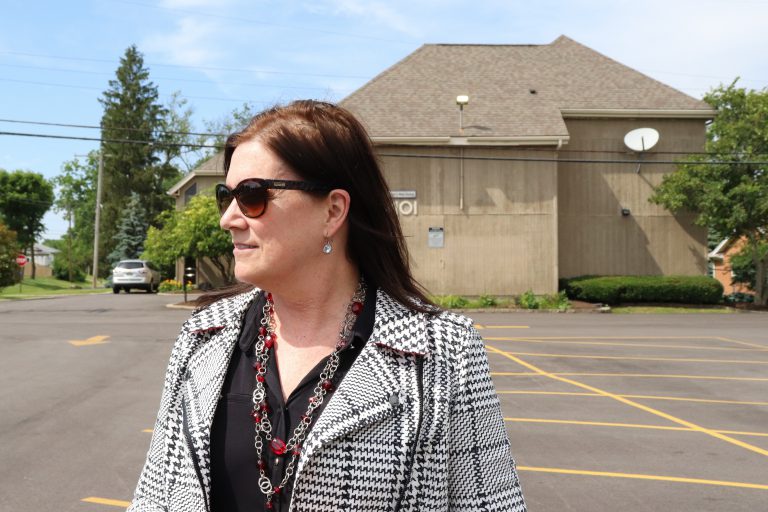“This is the spot,” Marilyn Evans says, standing in the empty parking lot of the Women’s Med Center in Kettering, Ohio.
The Women’s Med Center is the only health clinic for miles around that provides abortions. Now, it’s embroiled in a legal battle with the state that could lead to its closure – the clinic couldn’t obtain transfer agreements from local hospitals, as required under Ohio law.
“You think with certain human rights that people move forward,” Marilyn says, adjusting her oversized sunglasses. “But as we’ve seen over the course of the last few years, we’re… in unbelievable ways, we’re moving backwards from things that in my lifetime I thought were a done deal.”
Marilyn has been here before: once for a pro-choice protest. Once for her daughter’s abortion. And once in 1996 for her own abortion, after finding out there were complications with her pregnancy.
“It just seemed like the right decision, and it was the right decision for my husband, and it was the right decision for – I had a little kid at the time, a 4-year-old, and I worked,” Marilyn says. “And it didn’t seem like I would be able to take care of a kid with special needs.”
She knew it was the right decision for her and her family, but Marilyn says it was hard to talk to other people about what happened.
“Women aren’t comfortable when they have miscarriages,” she says. “No one wants to talk about losing a baby, period. It’s just so physical, and so emotional, and so personal that you really are holding your breath until you have a healthy baby in your arms.”
Her oldest daughter, Macy, remembers her mom being open and honest with her from a young age.
“Right away, my mom was already having conversations with me about sex, and birth control, and abortion, and just periods and things like that,” Macy says. “That always led my friends to always asking me questions and asking my mom questions. We were kind of that open household to talk about things.”
It wasn’t until Macy heard people talking about abortion at school that she realized it was a divisive topic.
“In high school, when people started to put a negative connotation towards abortion, I always stood up and said I didn’t agree with that,” she says. “Especially in my mind I was like, ‘My mom has had one.’ I would hear people at school talk about how it was a bad thing, or a terrible thing or a murder and I literally knew my mom had had one.”

But that got harder when Macy turned 17 and got pregnant. She says she was on birth control, and she and her boyfriend used a condom. She told her mom and got a pregnancy test.
“We just sat there and looked at it,” Macy says. “I knew 100% it was going to be positive. My mom just gasped, and we both cried a lot.”
Marilyn remembers that day vividly. She says she told Macy, “We are going to do what you want to do, and I’m a shoulder to lean on.”
Macy decided she wanted to have an abortion. Her mom drove her to the same Kettering medical center where she’d gotten her abortion decades earlier.
Macy says the worst part was facing protestors outside.
“I will never forget the people screaming in my face, calling me a murderer,” Macy says. “That’s the most unpleasant part.”
When she had the abortion, Macy had already surpassed the six-week mark. Under a recently-passed Ohio law known as the “Heartbeat Bill,” she wouldn’t have been able to get the abortion.
“My life literally would have been completely different. It wouldn’t be the life I wanted for myself,” she says. “It’s weird, it’s just a weird thing to think about. That my mom got hers so long ago, and that then I got mine almost 10 years ago, and that now, it’s going to be different.”
Outside the clinic, Marilyn points to a sign of that change. The building across the street is a “crisis pregnancy” center, run by a religious organization. The window facing the health clinic advertises “Pre-Termination Consultation.”
“Now I know those things exist, I’m furious,” Marilyn says. “‘Cause you wonder how many women have been tricked by it.”
Women and families bustle in and out of crisis center building. While the Women’s Med Center parking lot is empty, the lot across the street is full.
This story was produced by Side Effects Public Media, a news collaborative covering public health.

